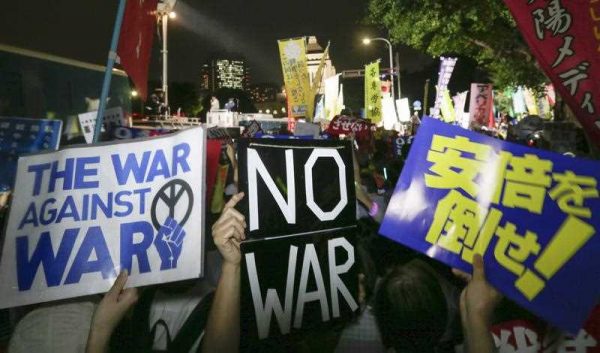The situation could become more complicated in the coming months, in the wake of Japan’s latest defence white paper, Tokyo’s fierce opposition to China’s development of offshore oil fields in the East China Sea, the enactment of Japan’s new security bills and Abe’s recent statement on the 70th anniversary of World War II.
On 21 July, the Japanese cabinet approved the defence white paper for 2015. The paper expresses strong concern over China’s ‘coercive’ maritime advances in the East and South China Seas, stating that Beijing continues to ‘show an uncompromising stance toward realizing its unilateral claims’. These actions include the reported construction of new gas fields in the East China Sea, which the white paper calls for a stop to. The paper argues that the security situation surrounding Japan has become increasingly tough due to China’s ‘high-handed’ activities that intend ‘to alter the status quo by force’. Therefore, it calls for Japan to boost its own defence capabilities.
A day after the release of the white paper, the Japanese government released photos and maps showing China’s construction of offshore gas fields in the East China Sea. Tokyo seems to believe that by developing those fields, China not only infringes on Japan’s territorial rights, but also violates a tacit 2008 bilateral agreement on joint gas field development. Tokyo is equally concerned about the economic and security threats posed by those oil fields. Tokyo fears that China would eventually try to siphon off oil and gas deposits from the Japanese side of the East China Sea, hurting the Japanese economy. China could also convert the offshore gas fields to military facilities and threaten Japanese security.
China has reacted strongly against Japan’s latest white paper, alleging that it is ‘artificially creating tensions’ and ‘stirring up fears about China’s military threats’. The Chinese foreign ministry has also insisted that by releasing the photos and maps of Chinese gas fields, Japan is not only provoking confrontation between the two countries, but also complicating the management of the East China Sea.
Meanwhile, the enactment of Japan’s controversial new security legislation in September 2015 could exacerbate tensions. The bills enable Japan to exercise limited forms of collective self-defence, which has until now had been considered unconstitutional. China has been extremely sceptical about the bills, arguing that could allow Japan to remilitarise. The bills enable Japan’s Self-Defense Forces to respond to ‘grey zone’ infringements — incursions that fall short of an armed attack — in Japanese territorial waters and airspace. Such provisions certainly enhance the possibility of an armed confrontation between Japan and China if there is a miscommunication, even over a small incident, in the East China Sea.
Abe’s recent statement on 15 August in commemoration of the 70th anniversary of World War II is another irritant in Japan–China relations. In the statement, Abe incorporated the four key phrases from the historic Murayama Statement: ‘aggression’, ‘colonial rule’, ‘deep remorse’ and ‘heartfelt apology’. But he did not offer a fresh apology for the atrocities wartime Japan committed in neighbouring states. Instead he argued that Japan’s future generations should not be destined to perpetually apologise. Clearly disappointed, China reiterated its demand for a sincere apology from Japan. China’s state-run Xinhua news agency was critical of Abe’s statement due to his ‘watered-down’ apology. It insisted that the ‘adulterated apology is far from being enough for Japan’s neighbours and the broader international community to lower their guard’.
The current stand-off between Japan and China can be largely attributed to the lack of political will to resolve bilateral disputes amicably. Instead of assuaging each other’s concerns on issues of shared interest, the actions of both leaders have seemed to aggravate tensions. The Abe administration’s recent acts are likely to only exacerbate tensions further. The adverse repercussions have already become evident. Despite Japanese media reporting Abe’s intention to visit Beijing on 3 September 2015 to meet Chinese President Xi Jinping, the Chinese foreign ministry dismissed such a possibility.
It is extremely disappointing to see that the economic bonhomie between Asia’s two major powers fails to be reflected in their political and diplomatic relations. It is impractical to resolve bilateral tensions by resorting to force. Both sides have a responsibility to refrain from aggravating tensions further and create an ideal environment to resolve their disputes through political and diplomatic means.
Dr Pranamita Baruah is currently a visiting fellow at the Sigur Center for Asian Studies, George Washington University.


It is quite clear that the so called dispute between China and Japan cannot be solved “through political and diplomatic means” contrary to what you have said. Perhaps resorting to force is the best choice.
Surely you jest?!? The ‘cost’ of the use of force in terms of human lives would be horrific.
It is always easy to say that resolution of any bilateral dispute (including Japan-China territorial dispute over the Senkaku/Diaoyu island) can be possible through military means rather than diplomatic means. Contrary to pro-militarist groups’ belief, forceful means cannot bring a resolution of the Japan-China dispute once and for all. It would not only devastate the lives and properties of both the countries, but also damage the bilateral relationship irreparably. This would not serve the interest of either of the country (especially in the economic front) given the strong economic bonhomie between Japan and China. Even if by forceful means, one comes to possess the disputed territory, there is no guarantee that the other will give up its own claim over the said territory after that.
one more thing needs to be taken into consideration in case of a war between Japan and China over territorial dispute. In case a war breaks out between the two, the US, due to its security alliance with Japan, will inevitably be drawn into it. This might eventually push some other countries to participate in the war, turning it into some sort of regional war.